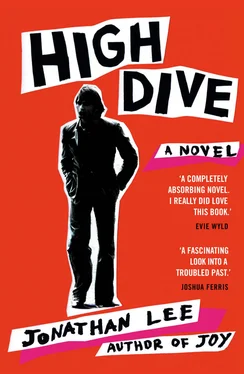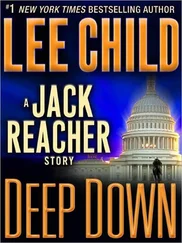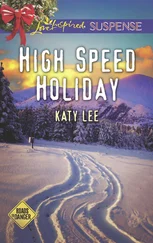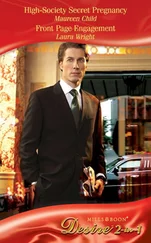There were voices behind him. Footsteps. Coughing. A muddle of well-meaning human sounds. Cones of light. Torchlight. Warm torchlight on his skin for a faint electric instant and then gone. The torchlight did not illuminate anything. It simply showed you the extent of the darkness all around. He made a shouting sound, noise not language, and brickwork came down and spat dust in his face. Might as well go to the yucca, the disappeared doorway. There was a chance he would find a little boy beyond. He coughed and spat. He groaned and shrieked. He squeezed his leg to hurt the pain.
He crawled towards the plant. Avoid the mountain of rubble to the left. Go right. Oh, oh, oh. Take the road more taken. ‘No.’ The path less troubled. ‘No.’ Back over the tinfoil castle, saying only the word ‘no’. Find the next bit of rubble. Get it in your sights. To get through this! To get through this. ‘I’m sorry,’ he said, but he was not sure what for.
He swallowed blood. He crawled into the area where the side door should have been. He got onto his good left knee. He wrapped his arm around concrete. He hauled, fell back. He spat and put weight on his left knee again. He hauled at more stone, thinking of Engelbert beyond, and the fourth or fifth time he did this he rose up to half-height and spat and saw, through burning eyes, an opening and a — a boy, standing beyond, very still.
The boy’s skin and clothes were dark with dirt. His eyelids snapped up like blinds. Those live-wire white eyes. A pink mouth began to blink.
‘Engel?’
The boy began to climb. Over the rubble he came, moving towards Moose on hands and knees, real or not real, something in between. The area in which he moved was no longer a room. It was a space owned by improvised alcoves, heaps of stone and twisted metal. Racy little tears sped down Engel’s cheeks. They left clean paths behind. Time slowed and progress was slow. There was torchlight behind Engel’s head. There was a fireman emerging through a further half-gone wall.
‘Engel,’ he said. ‘Not to me. Back there.’
The boy did not obey. He had his goal and with the blind stupidity of youth he was climbing like a little motherfucker. Climbed, he climbed, over the mountain he climbed. And then he stopped, maybe confused by all the light now shining near him. Maybe understanding.
‘Torch,’ Moose said. ‘Behind you, torch.’ His voice was a rough whisper now, too small and thick to be his own; he knew that he was losing himself.
The fireman behind Engel was drifting towards them. Debris crunched under his boots. Engel waited. There were jabby shadows overhead. Another fog breathing out its ghosts. We are unseen, he thought. The fireman doesn’t know we’re here.
His fingers did not want to clutch at stone. His grip was relaxing, opening to the world. He had to force himself to claw one final time. He grabbed a piece of stone and threw it. He did not see where it landed. He heard only the noise and the absence of noise. The fireman turned. Torchlight flooded Engel. No one said a word.
Moose watched the fireman lifting Engel. Felt such a pure rush of happiness, sugar on an exhausted tongue. The fireman would now be discovering how warm the boy was. Amazing the warmth a child’s body gives off. Heat monsters, the lot of them, a lifetime of potential packed in. He imagined Freya so small again and he was holding her, kissing her forehead.
He opened his mouth to shout to the fireman — the formality of saying I am here, me too, help me out? — but all he had left was a croak. He was croaking like he had as a boy in bed, woken in the night by a bump in the dark, fear taking his voice and hiding it. He threw another stone and nothing happened.
Engelbert was carried away over the fireman’s shoulder, arms hanging down like he’d been caught mid-dive. But he’d look up at him soon, wouldn’t he? And then the fireman would turn and see that he, Moose, was lying here: a battered Deputy General Manager. But the fireman continued to walk away with Engelbert, everything quiet and slow.
Survivors fanned out around the wounded hotel. Some were in the cordoned-off section of the King’s Road. Others were further back against the railings. Freya was sitting in a huddle of strangers, waiting, legs crossed like school assembly. Her sense of time was slipping. She’d been out here in the dark for weeks. She was as close to the Grand’s entrance as allowed. Some of those rescued were lifted out on firemen’s shoulders. Others were carried on stretchers. One was a minister with a long sad face, limp and alien in his bedclothes. Was her father still inside? Had he been carried out? Had she missed him? Was he lost? Was it over? Everybody cared but no one knew.
The uniforms and walkie-talkies, the police tape making spaces smaller. It screamed as it came off the roll. And how do these things end? Where basically do they stop? The shadows cast by events like this. For all she knew they could ripple on forever.
She sat and tried to make her thoughts cohere. The adrenalin had gone and she was sick with slow despair. There was a DO NOT DISTURB sign on the ground. She wanted the power of the night to die down into the mundane. She wanted the extraordinary to go back to being ordinary, please. She vomited. People moved. Please do not disturb.
The first trickle of dawn was a breaking egg yolk in the sky. She blinked and it resembled something else. The light came slow and wide across rooftops, warming long sections of crumbled stone, and she felt her youth being packed away, a piece of paper folded over and over, half-thoughts and quarter-thoughts, gone.
She told herself stay positive. She told herself Brighton was built on the wreckage of itself. It said so in ‘The Brighton Fact Pack’, kept behind the desk for curious customers. You burn Brighton down and it rises from the flames like that fire bird, arched neck, pinkish feathers — from the flames. Brighton was burnt down by the French in fifteen hundred and something. Survived. It was hit by the great storm of 1703. Survived. Windmills thrown. Houses flattened. Boats sunk. Survived. Survived Hitler. Survived each twist of history. Booming in the twentieth century. Thriving. Surviving. You thought it was finished but you were wrong. Brightonians were survivors. Many of them were lame and old and hampered by terrible dress sense, but they were survivors. The English were survivors. The Irish. The Scottish. The Welsh. Think of Lowri ‘The Look’ Morgan. Make a sheep-shagging joke in class and she’d nuke you. She didn’t need words. A mascara-thick glance was all it took. The glance said you were lucky to be alive.
And he would come, wouldn’t he, out of the dreaming hotel? Her hands were dirty. She wiped her eyes. She wanted her dad back now.
Tomorrow there would be water creeping onto Brighton Beach. He could relax now, stop struggling. He could let the hotel take his weight.
In his wrecked office Moose saw lime greens and yellows. Time slowed and an image came from colour. He rolled onto his back and looked at the peeled-away ceiling and he saw it, an image of himself. He was on a three-metre springboard, thunking his weight down to get going. The air was clear and bright. The board did what it was asked to do. It flicked him high, his body suspended in nothing, revolving with perfect grace.
He waited to see himself fall into the water. Here the image flickered out. He tried to reimagine it, but the dive would not take hold. He blinked. He was not in the air. He was in the rubble of this hotel on the surface of the earth. Earth was the proper place for grace. This was the last thing he knew. His humanity was tangled up with the humanity of those trapped in other rooms. They were more real than him. He existed for them. He had never been so afraid. All the people he couldn’t be, all the stories he couldn’t hear, this is what life was. He held on to the last few weeks as he stretched out and died. Held on to the daily battles with his daughter, to the factless beauty of a broadloom rug, to the private moments history so rarely records but which make up the minutes in the hours. ‘Please,’ he said, but it did not help. Someone had considered this fair.
Читать дальше












